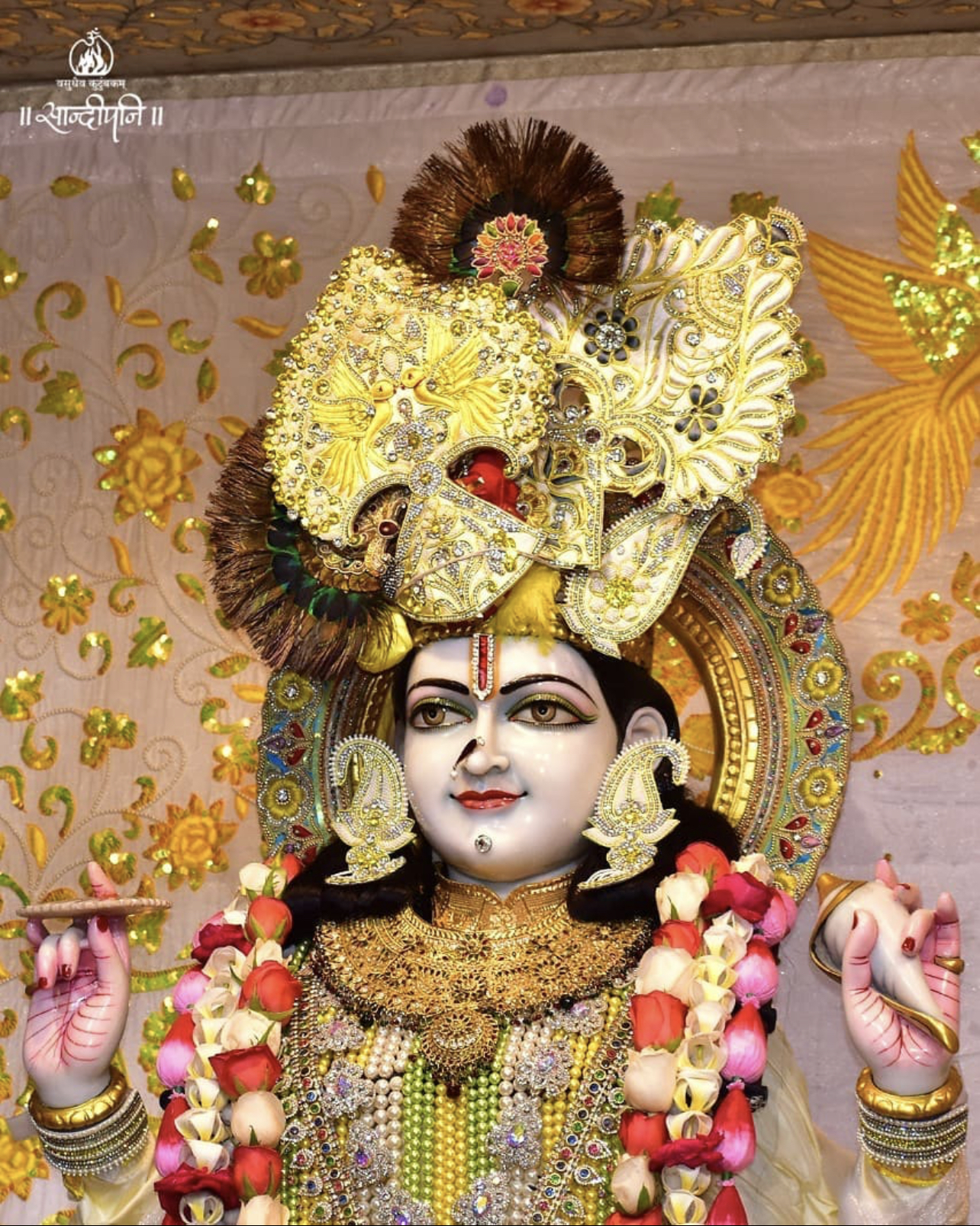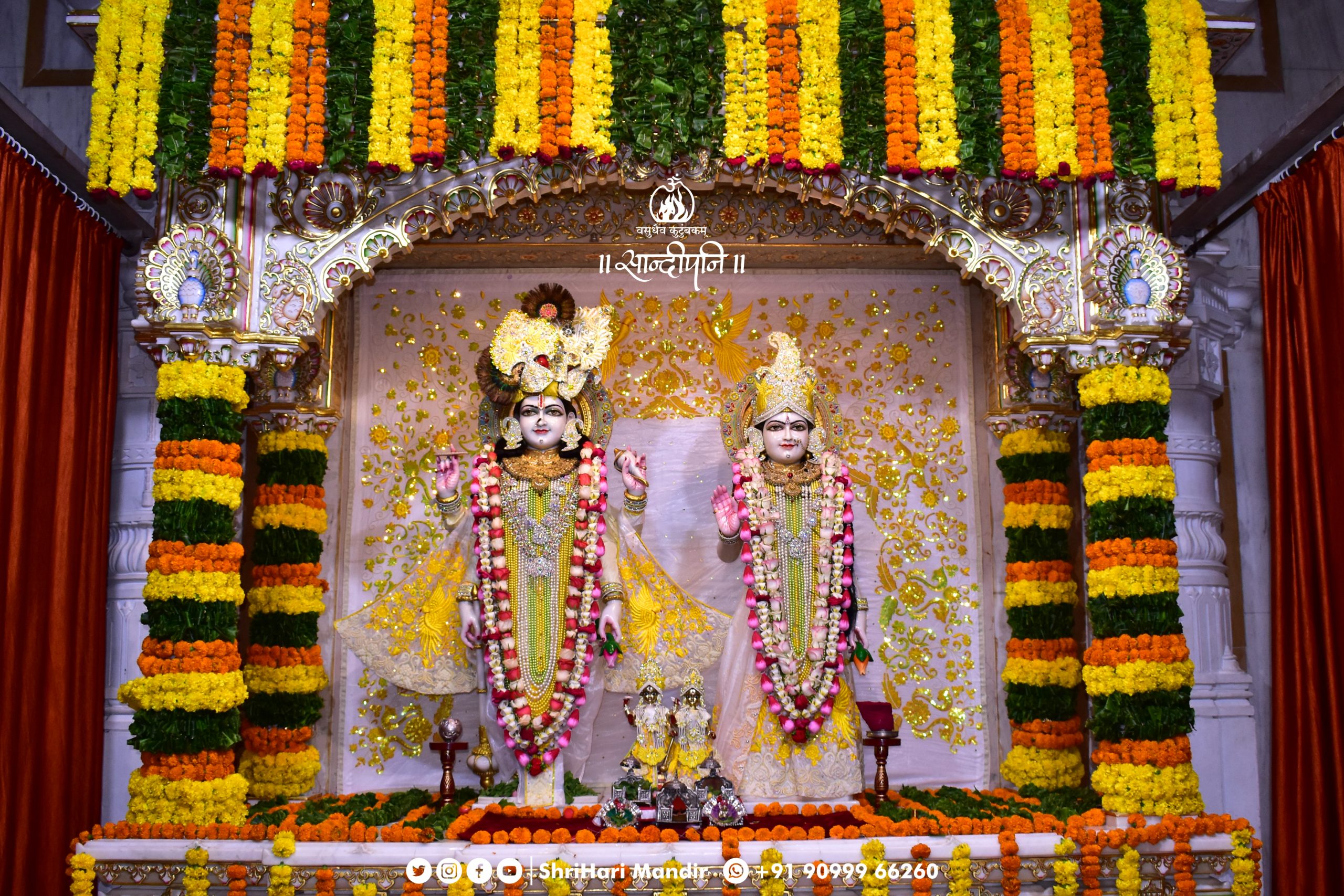Indira Ekadashi Vrat Katha
— 💐Ensuring a Blessed Lineage by Honouring our Ancestors
⚫ ShriHari Mandir (Porbandar) is celebrating Indirā Ekādaśī fast on Saturday, 2nd October, 2021.
⚫ This fast is observed on the eleventh day of the second fortnight (Krṣṇa pakṣa) of the month of ‘Bhādrapada’ in the Gurjar region, and of the month of ‘Āśvina’ in the Northern part of India.
⚫ The unique significance of each Ekādaśī Kathā is explained to Dharmarāja Śrī Yudhiṣṭhira Māharāja by Śrī Krṣṇa, in the ‘Uttara Khaṇḍa’ of the Padma Purāṇa.
⚫ This Indirā Ekādaśī rids one of the greatest of sins. Notably, it uplifts and liberates even those ancestors who may have fallen to lower planes of existence.

⚫ What is the Story of Indirā Ekādaśī?
✸ In the age of Satya (Satya-Yuga), there was a prince called ‘Indrasena’, who later became King of, and righteously served, the town of Māhiṣmatī. His fame was well-spread all over the world.
✸ King Indrasena would spend his time chanting Śrī Krṣṇa’s liberation-granting Names, and was engaged in the ritual contemplation of the Self.
✸ One day, when the King was blissfully seated in his assembly, Devarṣi Nārada arrived. Seeing the Devarṣi there, King Indrasena humbly folded his hands and stood up. He welcomed Nāradajī through the appropriate ritual worship, and offered him a seat.
✸ The King then folded his hands again, saying,
‘Oh most-excellent Sage, by your Grace, I am doing well. By attaining a sight of yourself today, all my offerings have become successful. Oh Sage, please bestow upon me your Grace, by kindly letting me know the reason of your arrival.’
✸ Nāradajī said,
‘Oh best of all, listen—my words are going to surprise you.’
He continued,
‘I came from Lord Brahmā’s realm to Lord Yama’s realm. There, the Lord of Death and Righteousness (Yamarāja), who was seated on a supreme seat, worshipped me through devotion. At that time, I had also seen your father in Yamarāja’s assembly—who was there due to the fault of having broken a fast.’
✸ ‘He has sent with me a message for you; please listen,’ continued Devarṣi Nārada.
‘Your father has said, “Indrasena, my child, please send me to Heaven from the merit of the Indirā Ekādaśī fast.”
✸ Nāradajī encouraged King Indrasena to observe this Indirā Ekādaśī fast, through which his father would attain a place in Lord Viṣṇu’s abode.
Here, King Indrasena asked,
‘Dearest Nāradajī, please tell me about this Indirā Ekādaśī fast. On what side, in which condition, and how should one observe this fast?’
✸ Nāradajī explained to the King the rituals involved in observing this fast, and then fell into a deep contemplation.
✸ Having learned about the fast, King Indrasena observed it along with his queens, sons and servants. At the completion of this fast, the sky burst forth with flowers, and King Indrasena’s father went to Lord Viṣṇu’s abode, mounted upon an eagle.
✸ King Indrasena, too—after enjoying a smooth reign, and handing over the kingdom to his son—attained Heaven.

⚫ How to observe this Indirā Ekādaśī fast?
▪️ On the excellent day before Indirā Ekādaśī (Daśamī), one should:
– With a faithful mind—take a bath in the early morning;
– Again take a bath, and with a concentrated mind, have one meal in the afternoon;
– Sleep on the ground at night.
▪️ On the day of Indirā Ekādaśī:
– At the end of Daśamī, and beginning of Ekādaśī (at the break of dawn), one should:
– Brush one’s teeth and wash one’s face;
– Then, one should faithfully read the following mantra and thus take the regulated practice (nīyama) to observe this fast:
अद्यस्थित्वानिराहारःसर्वभोगविवर्जितः |
श्वोभोक्ष्येपुण्डरीकाक्षशरणंमेभवाच्युत ||
adya sthitvā nirāhāraḥ sarvabhogavivarjitaḥ |
śvo bhokṣye puṇḍarīkākṣa śaraṇaṃ me bhavācyuta ||
‘Oh lotus-eyed Lord Nārāyaṇa, today I am staying away from all forms of enjoyment and abstaining from food. I will resume to eat tomorrow. Oh Acyuta, bless me with your refuge so that I can be successful in fulfilling this fast.’
– In the afternoon, one should:
– Offer oblations to one’s ancestors (pitṛ śrāddha) in front of Lord Viṣṇu (in the form of a Śāligrāma) for the delight of one’s ancestors;
– Then, invite and honour deserving Brāhmaṇas with a sāttvika meal, accompanied by due remuneration (dakṣiṇā) according to one’s abilities;
– Knowledgeable men should (after inhaling the subtle essence (scent) of the balls) feed balls of flour (annamaya piṇḍa) prepared as part of the śrāddha offerings to ancestors, to a cow.
– At night, one should:
– Engage in the ritual worship of Lord Hṛṣikeśa, and stay the night awake near Him.
▪️ On the day after Indirā Ekādaśī (Dvādaśī):
– In the morning one should:
– Once again worship Lord ShriHari with devotion.
– Then invite over and feed Brāhmaṇas; and then sit down to break one’s fast in silence—along with family, friends and relatives.
⚫ One who reads or listens to the significance of this Ekādaśī Kathā, is liberated from all their sins.
🌐 Stay tuned to know more about the respective significance of, rituals involved in, and fruits reaped from, each Ekādaśī Kathā!
🔆 #PujyaBhaishriSays—“One must perform śrāddha ceremony with faith. If the departed soul has been liberated, where does the auspicious fruit of this action go? Back to the one who has performed it. May we express our gratitude via this ceremony. Let us also act as per Dharma, not only speak of it!” @PPBhaishri.
☀Additional Readings on the Significance of Śrāddha: https://sandipani.org/is-sraddha-sanskar-rituals-for-deceased-necessary/
🔆 #DidYouKnow—“Just as disciplined and daily sleep removes the fatigue of the body and mind, and grants renewed life; similarly, fasting on Ekādaśī grants rest to our digestive system and leads to its strength and vitality. The discipline and self-restraint of a Vrata (fast) strengthens the mind,” tweets @PPBhaishri.
🌙 #FunFact—There are two Ekādaśīs in every month; falling on the eleventh day of every lunar fortnight. The Ekādaśī falling during the waxing phase of the moon (bright lunar fortnight) is known as ’Śukla pakṣa’ Ekādaśī; and the one falling during the waning phase of the moon (dark lunar fortnight) is known as ‘Krṣṇa pakṣa’ Ekādaśī.
#PuraanPrasaad by Rishi Dhavalbhai Joshi
#indiraekadashi
#ekadashi
#vrat
#fast
#fasting
#Krishna
#Yudhishthira
#Bhadrapad
#Ashvin
#Chaturmaas
#puraan
#padmapuraan
#SandipaniVidyaniketan
#ShriHariMandir